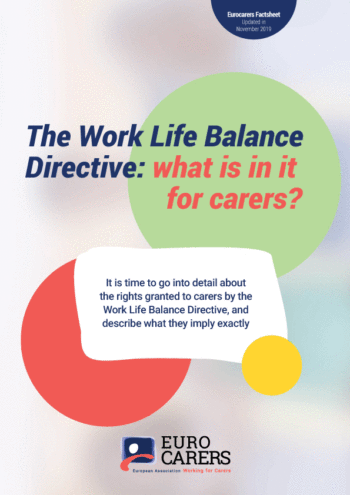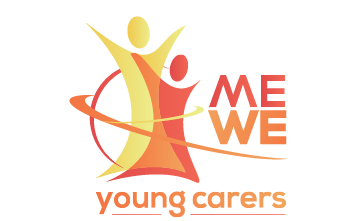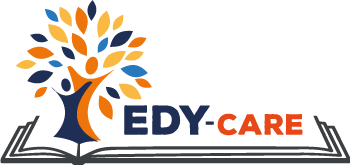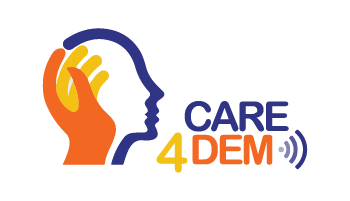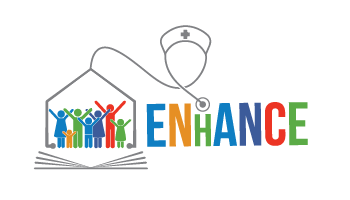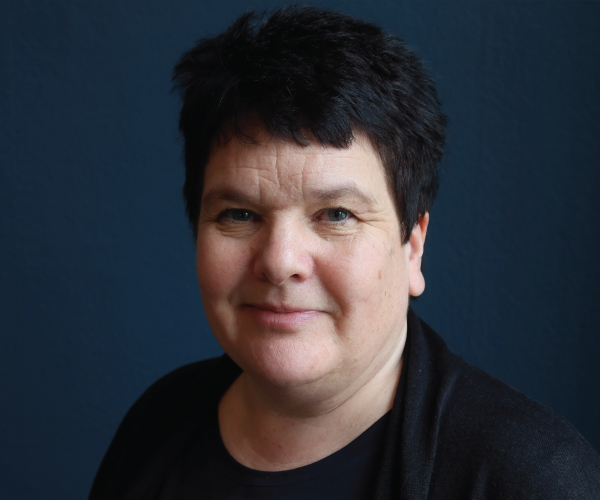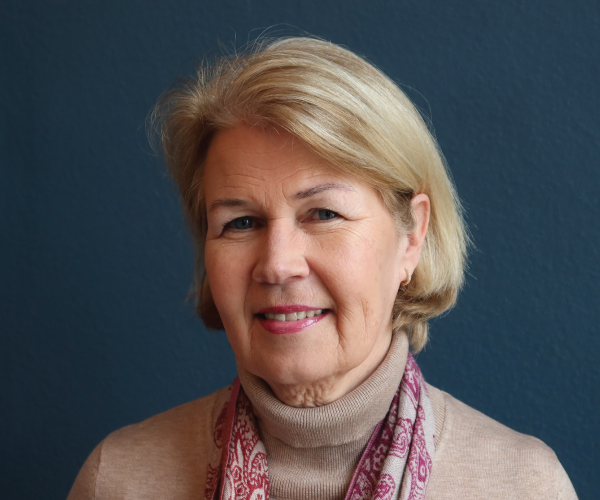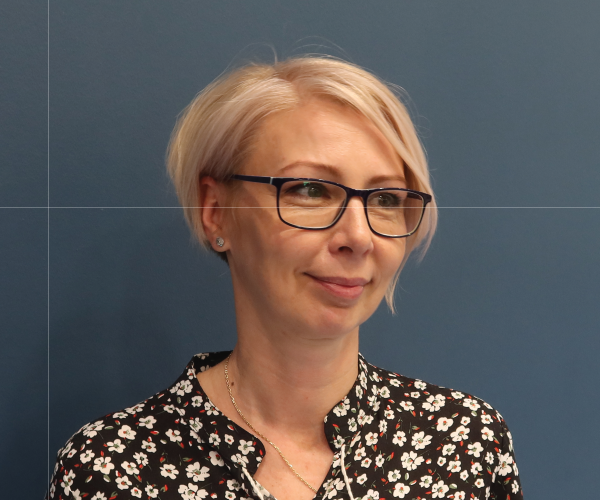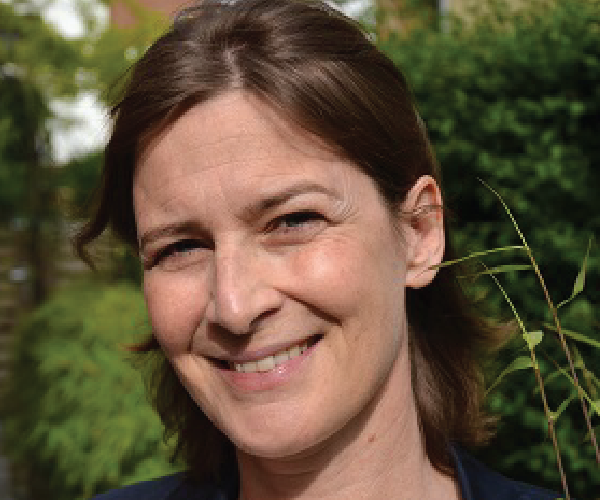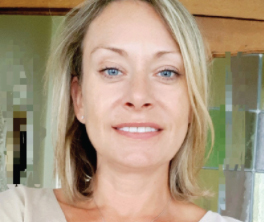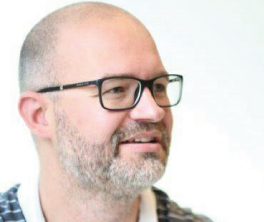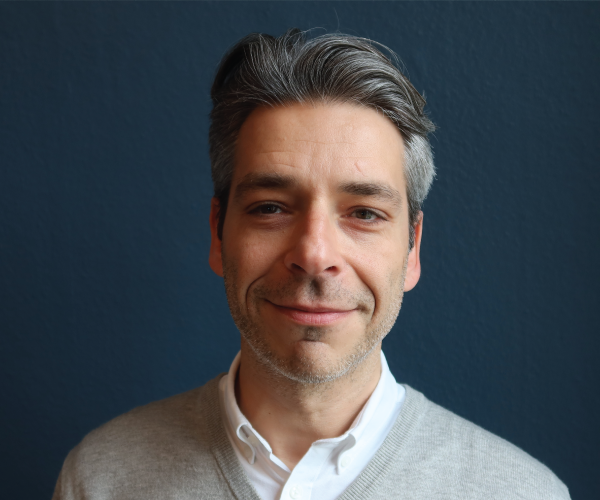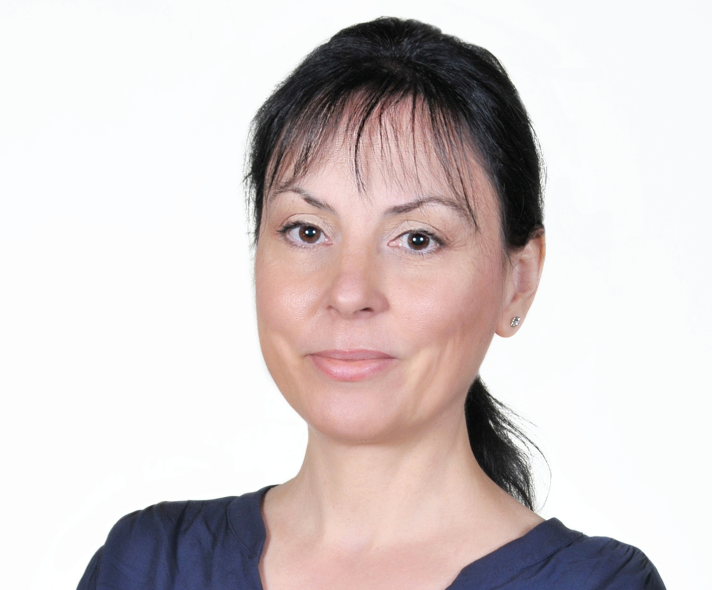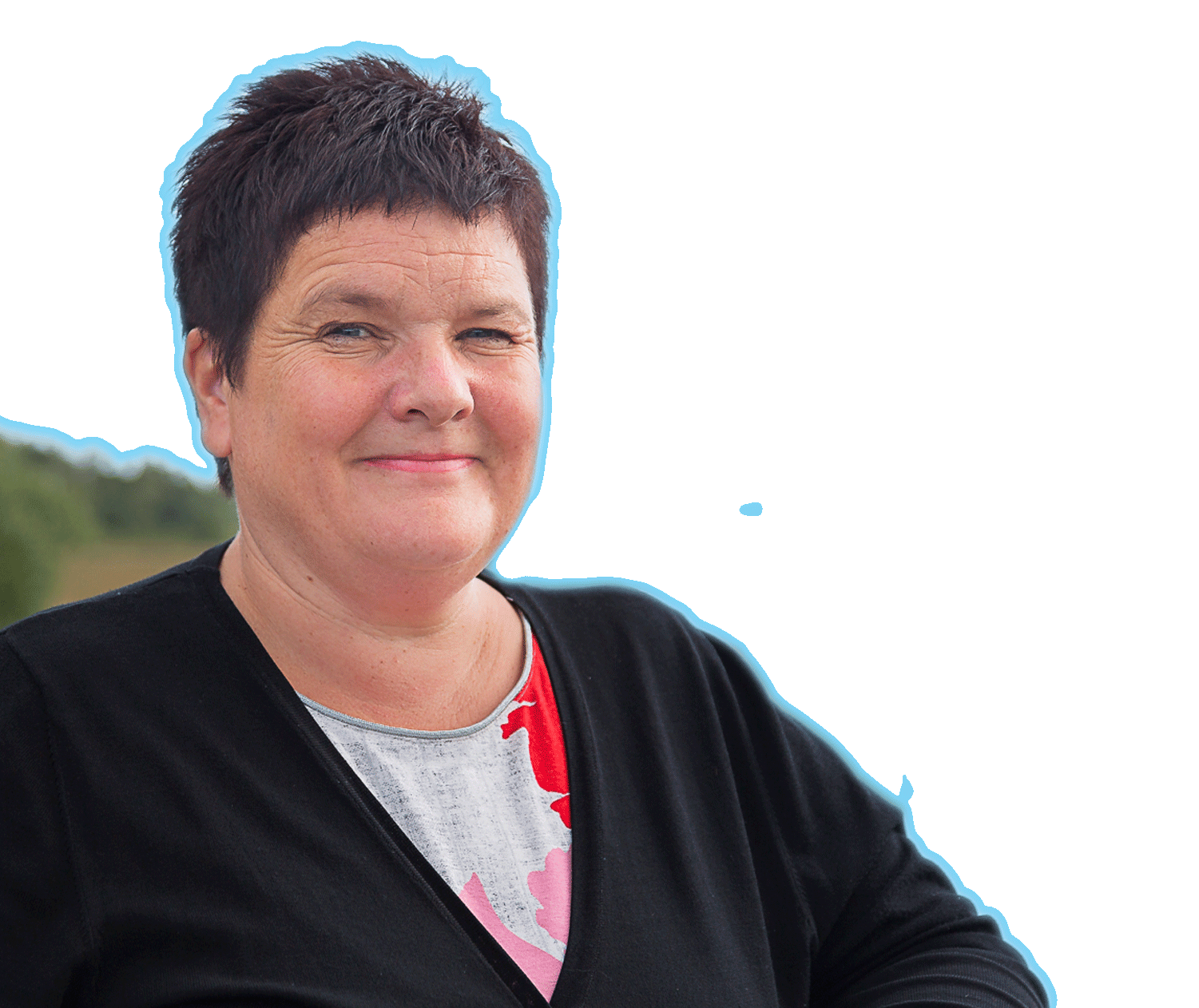
Dear Readers,
The Eurocarers network can currently count on a strength of 71 members in 26 countries across Europe. Five of our members have joined the ranks of our movement in the last year, which shows the rising visibility and appeal of our work in favour of carers’ rights and of better data on the impact of informal care at individual and societal level.
2019 has been an active year, with more than 10 seminars, 30 project meetings and 150 events (co-)organised or attended by Eurocarers. The meeting of our Research Working Group served to inform the reflection around good-quality and harmonised data on care and caring. On its end, our Policy Working Group has continued to explore the pros and cons of existing practices to stimulate innovative and evidence-based policymaking at all levels of governance. The group’s meeting in Copenhagen gave a chance to study the Danish model of social policy and carers’ support. As described in this report, the knowledge produced by our network and our involvement in 13 research projects provide us with great sources of evidence. However, none of this would be possible without the incredible support of the European Commission under the EaSI programme.
2019 has also been a year of challenges. First, the EU election called for a forceful awareness-raising campaign about the situation and needs of carers in Europe. Then, the entry into force of the Work-Life Balance Directive in August 2019, following a long and arduous advocacy effort, had to give way to a series of in-country events to monitor the Directive’s implementation. Finally, Eurocarers’ collaboration with international bodies (such as the UNECE) could only reach its full potential if strategically connected with our members’ action at national/regional level. I am glad to say that the Eurocarers Secretariat and network have proven worthy.
I would like to thank the Secretariat for their diligent work. Our Director, Stecy Yghemonos, has been in post since Eurocarers was set up in its current form in Brussels in 2014. The results of his leadership clearly reflect in our organisation’s development and in the reach of carers’ voice. The financial sustainability of the network is also ensured for the foreseeable future.
I am also grateful to Elizabeth Hansson, Vice-President and Chair of our Research Working Group, who has not only been a great guide in my first year as President but has also made an immense contribution to our collective work. Our Treasurer, Ivar Paimre, our Board members, Bruno Alves, Valentina Hlebec and Anita Vatland as well as our advisors, Sara Santini and Katherine Wilson have also given great input. I also want to thank Chloe Wright for her instrumental role with our Policy Working Group. Finally, my thanks to Christine Marking for her always-valuable support.
A lot remains to be done do to give informal care the recognition and attention it deserves. Until a few weeks ago, who could predict that a new coronavirus would cause a global crisis, make the future murky and emphasise how restrictions and the lack of adequate services impact carers? Yet, many of our members are now with their hands full, providing support to millions of informal carers.
The aftermath of the pandemic and its lasting impact on the economy will undoubtedly make our work more difficult and yet important in the years to come. But I know that our network will remain more committed than ever to make a difference with and for informal carers. Carers should not have to face hardship as a result of their caregiving – they should be celebrated!
Sari Tervonen – Eurocarers President
Dear friends and colleagues,
Welcome to our annual report. As you will read below, 2019 has proved another year of progress and achievement for Eurocarers and the European Carers Movement as a whole. The momentum around care and caring has indeed continued to grow at all levels of governance, not least thanks to our network’s prominent input across relevant policy areas. In the last few months, we have paid specific attention to ensuring that the international impetus around the future of care – and the situation of informal carers – translates to tangible action. We are pleased to report that the list of policy makers and stakeholders involved in debates about these topics is rapidly expanding. Recent policy initiatives in Italy, Ireland, France, Germany, Portugal and the UK are only but a few tokens of our collective impact in favour of carers.
Our message is stronger and clearer than ever – and now widespread: the growing long-term care needs of the European population can only be met via a combination of policy measures focusing on both formal and informal care. Investment in good-quality professional care services remains the core component of universal care across Europe. But it is very clear that a complete shift from informal to formal care is virtually impossible given the central role played by informal carers. The success of attempts to meet the care needs of the European population therefore depends on our ability to strike the appropriate equilibrium between professional and informal care, while minimising the economic, social and human rights trade-offs between one and the other.
This vision is at the heart of our work. Eurocarers is more committed than ever to defining further what this balanced approach could and should look like. Our collaboration with the WHO, EU institutions and fellow NGOs will continue to serve as a platform to move this forward.
Our advocacy campaign is a marathon not a sprint, even though we are progressing at a good pace. None of our achievements would be possible without the amazing dedication and work of our member and partner organisations. So, I would like to warmly thank them all for their participation and support to our activities and I look forward to the next steps of our shared journey!
Stecy Yghemonos – Executive Director

ABOUT US

Eurocarers is the European network representing informal carers and their organisations, irrespective of the particular age or health need of the person they are caring for. Our network brings together 71 carers’ organisations as well as relevant research & development organisations from 26 countries – a combination that enables evidence-based advocacy. These organisations are active at international, national and regional level. An overview of our membership is available on our website: https://www.eurocarers.org/membership.
Eurocarers is designed as a platform for collaboration, support, exchange, awareness-raising and policy change. Our collective efforts seek to ensure that the existing and growing care needs of an ageing European population are addressed in a universal and equitable way and that the essential contribution of unpaid/informal carers in the provision of care is valued and recognised as central to the sustainability of health and long-term care systems, and supported to prevent the negative impact of care on carers themselves. We believe that carers’ know-how and needs are worth listening to and that people should have the right to choose freely whether they want to be a carer, and to what extent they want to be involved in caring.
The mission of the Eurocarers network is therefore to act as a voice for informal carers by:
- Documenting and raising awareness about the significant contribution made by carers to health and social care systems and the economy as a whole, the impact of caring on carers’ ability to maximise their life prospects and maintain an active and productive life, as well as the need to address the daily challenges facing carers across Europe;
- Contribute to evidence-based policy development at national as well as European level that take account of carers, i.e. promote their social inclusion, the development of support services, enable them to remain active in paid employment and maintain a social life; and
- Promote mutual learning and an exchange of good practice and innovation throughout the EU.
POLICY ENVIRONMENT
Numerous positive developments have taken place since Eurocarers opened its secretariat in Brussels in 2014, following the signature of a first framework partnership agreement with the European Commission under the Employment and Social Innovation (EaSI) Programme. The number of stakeholders and policy makers who acknowledge the challenges related to the provision of long-term care in an ageing Europe – and the crucial contribution made by informal carers to care systems, society and the economy as a whole – continues to grow at international, EU and national levels. An increasing number of policy developments targeting informal carers, or of relevance to them, are also unfolding in and outside the care sector, notably at national and regional level. In 2019, Eurocarers has actively promoted the 10 steps defined in its EU Carers Strategy to help shape and inform policy dialogues related to the social protection of informal carers, the value of informal care, young carers, informal care as a barrier to employment, education and equal opportunities, and, of course, the development of people-centred long-term care services (and the role of carers therein).
The EU Pillar of Social Rights recognises the need to act proactively in order to reinforce social cohesion within the EU. It takes a holistic point of view, choosing to address all challenges at once. It values adequate social protection as a productive factor, and social convergence as a necessity. A majority of the 20 principles contained in the Pillar have a direct bearing on the carer’s experience. Eurocarers therefore approaches them as a vehicle for engagement and progress. If fully and properly implemented, our network is convinced that the EU Pillar of Social Rights will have a positive impact on the daily life of millions of informal carers across Europe and will provide them with the equal opportunities they need and seek. We therefore closely monitor and contribute to the transposition of at least 10 out of the 20 principles. Logically, principle 18 on universal access to affordable and good-quality Long-Term Care (in particular community-based and home care services), remains a natural entry point for our advocacy efforts in support of policies that:
- Favour sustainable, equitable, universal and good-quality care services;
- Recognise and support informal carers as important contributors to Europe’s care systems; and
- Ensure informal care does not deprive carers from an active, productive and fulfilling life.
We nevertheless do not limit our efforts to that component of the Pillar. The principles that relate to access to health and work-life balance for parents and carers also have a prominent place in our work programme. We indeed monitor the transposition of the work-life balance directive and keep supporting integrated social and health care by expanding our collaboration with the health sector. We also continue to support and call for the collection of better and more comparable data about care and caring in Europe.
The principles related to inclusive education, gender equality or equal opportunities are equally important to make the case for carers in Europe given the demographics of that group (which is mainly composed of women, with largely invisible components among younger people). Many young carers struggle to balance their daily life with caregiving responsibilities and experience mental health barriers in relation to school, further education and employment issues as a result of their caregiving. Addressing their needs is therefore in direct compliance with the objectives of the EU 2020 Strategy and the principles of the Pillar. The issue of ‘Young Carers’ is therefore the primary focus of our communication strategy this year and our efforts to shine a light on the specific challenges facing them will culminate with the co-organisation of the International Young Carers Conference in Brussels in June 2021.
EUROCARERS’ INSTRUMENTS FOR POLICY CHANGE

The work of the Eurocarers Young Carers Working Group (EYCWG), which currently consists of 30 young carers from 10 countries (+ Australia) is a great asset to guide and inform our policy and advocacy work on the topic, building on young carers’ first-hand experience in addition to our network’s intelligence. Our programme of activities also provides the young carers with an opportunity to meet, learn from each other, be briefed, consulted and involved in policy dialogues about EU priorities that concern them.
The Group held its face-to-face meeting on the 21-22 May 2019, in Copenhagen. Young carers were consulted on our key policy recommendations around the EU election and on our Strategy for a European Carers Awareness campaign 2019-2021. The main outcomes of the meeting can be structured around three topics: the need to identify young carers and the reasons why they often do not reach out themselves; the type of support measures required and/or in existence; and the need to improve instruments to listen to and interact with young carers, based on participants’ experience. These three themes – ‘Identify, support and listen to Young Carers’ – will structure both Eurocarers’ Communication Strategy in 2020 and the programme of the International Young Carers Conference to be held in Brussels in June 2021.

The Eurocarers Policy Working Group (EPWG) is our network’s primary instrument to lead a process whereby the Secretariat and member organisations identify promising/challenging policy developments at EU, national and local level and align their policy messaging to maximise the impact of our advocacy work. The face-to-face meeting of the EPWG was held on the 21st May 2019 in Copenhagen, Denmark and was attended by 46 participants from 32 organisations in 15 countries. The meeting was used to exchange with members on:
- Ways of combining the implementation of both the EU Pillar of Social Rights and our European Strategy on Carers (developed with the EPWG and launched at the end of 2018) at all levels of governance, with a specific focus on the Work-Life Balance Directive, as well as the potential offered by the EU Semester and Structural Funds;
- Good practices regarding the dissemination of the European Strategy on Carers at national and regional level – using the Scottish and Belgian examples as illustrations of ongoing policy developments;
- Eurocarers upcoming material and activities to document the situation and needs of carers and to inform the development of carer-friendly policies – including our updated overview table on the situation of carers across Europe and measures in place to support them, our new series of country profiles capturing both formal long-term care services and support measures targeted at informal carers.

The Eurocarers network can also rely on the European Parliament’s Interest Group on Informal Carers to monitor and analyse EU policy development for its impact on carers and to propose and advocate concrete action in order to improve the day-to-day situation for Europe’s many carers, working in close partnership with relevant stakeholders. In 2019, the Group consisted of 31 MEPs from 11 countries interested in care and caring.
The EP Interest Group held a meeting in Brussels on the 25th September 2019 on the topic “Enabling young carers to pursue their life goals – Converting research findings into policy actions”. The event proved particularly successful and shed light on the work of the Eurocarers’ Young Carers Working Group (EYCWG) and our network’s plans regarding a European-wide awareness-raising campaign on the situation and needs of young carers.
In addition to the work of its Working Groups, the Eurocarers secretariat – in its role as a knowledge-broker between carers, academics and policy makers produces ad-hoc policy briefings and position papers in order to support and inform the development of evidence-based policies and practices on care and caring at EU and national level. The positioning we have gradually secured as the organisation conveying the voice of European informal carers also gives us a chance to network and interact with the EU institutions as well as with a long list of stakeholders (WHO, OECD, Civil Society Organisations, the Industry) – thereby getting an insight into the perspective of various key actors.Building on this and on the research and good practices collected through our network, we have produced 4 new Policy briefings and 7 position papers and consultation responses in 2019 (see details in next section).
CAPACITY BUILDING
Capacity building is another central part of our annual work programme. Eurocarers indeed constantly seeks to improve its members’ ability to navigate the EU/national policy environment in which they work and identify the opportunities and challenges that they bring about. Our rolling programme of activities therefore includes peer training and capacity building events designed on the basis of our members expertise and areas of interest. These face-to-face or online capacity-building events usually bring together members and partners of our network in smaller groups. They therefore enable the exchange of good and promising practices between members in line with the EU priorities in order to actively contribute to the implementation of the EU2020 objectives through the European Semester process, the European Innovation Partnership on Active and Health Ageing and any other relevant instruments. Over the reported period, Eurocarers organised 5 capacity-building events.
A Study Visit on the topic “Connected carers: the future of a carer-friendly society?” was held in Brussels on the 12th September 2019. The rationale for the visit was the potential offered by ICT-based solutions in the development of innovative approaches that address carers’ needs, particularly against the backdrop of the demographic transition and the pressing need for support to informal carers. In particular, ICT can be instrumental in breaking the isolation that carers often suffer from, due to their caring duties as well as to the lack of recognition of their role in our societies. ICT-based solutions can help carers access information, training and validation of skills, as well as peer support, in order to improve the quality of care they provide, as well as their own quality of life and ability to participate in society. ICT can also facilitate the coordination between carers and care professionals, supporting the autonomy of both the patient and the carer and the delivery of care at home. As a network, Eurocarers has been a strong advocate of adequate and accessible ICT-based solutions to support carers across Europe.
The study visit brought together 28 participants from 14 countries, including 18 delegates from national carers’ organisations, 4 representatives of national research organisations and 6 envoys from the European Commission, Consultancy companies and European umbrella organisations.
The event:
- Gave Eurocarers’ members an opportunity to learn from each other and take stock of our network’s in-house knowledge and experience, which is particularly useful in this area since innovative practices are not always well documented given the endemic lack of resources;
- Maximised Eurocarers’ capacity to learn from and reflect on relevant EU projects, building on our members’ expertise. In particular, two sessions focused on the CARE4DEM project, aimed at developing a model of web-based mutual aid groups for informal carers;
- Gave participants a chance to hear the perspective of a selection of external guests, from the EU Commission and relevant EU civil society organisations; and
- Laid ground for future joint initiatives at policy and/or practice level.
Eurocarers also organised three Knowledge-exchange Workshops as part of its AGM 2019 , on the 20-22 May in Copenhagen. These included:
- A Nordic Seminar, held on the 20-21 May 2019, with Eurocarers members from Denmark, Sweden, Finland and Norway in order to discuss the perceived decline of the social protection system in the region and explore synergies among fellow members. The event prompted a ‘Nordic call for action on carers’ rights’, which was widely disseminated through Eurocarers communication channels;
- A structured review of the existing support measures available to informal carers in Denmark generally and Copenhagen in particular (21 May 2019); and
- A Research and Policy Seminar about the specific situation and needs of Young Carers (22 May 2019).
Eurocarers also produces regular policy briefings in order to update its members and partners about new policy initiatives and developments with a potential positive or negative bearing on carers across Europe. These briefings collate facts and figures about care and caring to support the work of policy makers, carers’ organisations, as well as health and social care providers at all governance levels. The objective of these publications is to align priorities, identify entry points in the EU agenda(s) and convey the reality of carers at EU level.
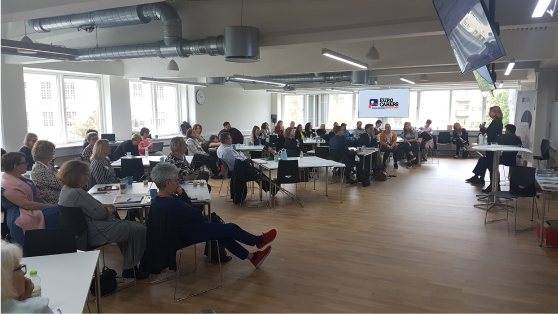
The 4 Policy Briefings developed by Eurocarers in 2019 to complement our ‘why carers count’ series included:
- A revisited version of our Briefing on ICT for carers (September 2019);
- The European Semester 2019: how to build on the increasing focus on care? (October 2019);
- The Work-Life Balance Directive: what’s in it for carers? (November 2019); and
- The European Structural and Investment Funds (ESIF) (December 2019).
Our Overview Table on the Number of carers and existing support measures across the EU, available through the ‘About Carers’ section of our website continues to provide an updated and concise overview of the situation of carers across Europe. Nevertheless, in order to pave the way for a potential benchmarking of EU countries’ carer-friendliness, our network launched a new series of concise country profiles capturing the measures in place for the provision of formal Long-term care as well as the degree of compliance with our EU Strategy’s 10 steps.
Currently, a first batch of 15 country profiles is available on the Eurocarers website and the objective is to have all of the EU states covered ASAP. These profiles will be revisited on a regular basis (at least every year) to monitor progress and sustain our advocacy work at all levels of activity.
The 10 steps towards carer-friendly societies across Europe
Step 1: Define and acknowledge Carers
Informal Carers are vital, both to the care of people with long-term conditions and disabilities in the community and to the economy of EU countries. Yet, decision makers largely fail to meet their needs due to the use of narrow-focused definitions of informal care or the absence of such definitions in the legislation.
Last Updated on May 26, 2020
Step 2: Identify your Carers
Despite a growing momentum around care and caring, Carers still form a largely invisible and undervalued workforce in many EU member states. When Carers are identified early and properly supported, they are better able to continue in their caring roles and maintain a healthy lifestyle.
Last Updated on May 26, 2020
Step 3: Assess the needs of your Carers
Carers should have access to an assessment of the measures that might help make their life easier. This will allow to develop a personalised set of support measures which, in turn, can help support change. Carers organisations have a vital role to play in this process by engaging Carers in co-designing these assessment tools and by supporting the dissemination and uptake process.
Last Updated on May 26, 2020
Step 4: Support multisectoral partnerships for integrated and community- based care services
Integrating care, services and supporting activities means that the design and delivery of care is made in a more effective manner, so that users receive a continuum of preventive, curative, rehabilitative and support interventions throughout the life course which are suited to their needs over time and are seamlessly available across different levels and areas of health and social systems. Carers should be central to the planning, shaping and delivery of services for the people with care needs and in relation to support for themselves. In this context, informal Carers should be approached as partners in care.
Last Updated on May 26, 2020
Step 5: Facilitate Carers’ access to information and advice about care, caring and care-life balance
Carers often need to take on caregiving responsibilities without warning or planning. Most of them do not realise that they are Carers and, when they do, they often struggle to access basic information about what it means to be a carer, benefits and entitlements, support services, employment, Carers’ breaks, training opportunities or the potential consequences for them and the cared-for person.
Last Updated on May 26, 2020
Step 6: Pay attention to Carers’ health and prevent negative health outcomes
Carers frequently suffer poor physical and mental health outcomes as a result of their caregiving activities, when not adequately supported. Early identification and support along with specific preventive measures are therefore essential to maintain Carers’ health and wellbeing, prevent negative health outcomes and avoid creating a vicious circle where Carers themselves become unwell and in need of care.
Last Updated on May 26, 2020
Step 7: Give Carers a break
Respite care is often perceived as the most important and common form of support to alleviate caregiving burden and stress. Respite care can provide Carers a break from usual caring duties for a short period or a longer time. Without respite, Carers may face serious health and social risks due to the stress associated with continuous caregiving, and may also have little time for essential personal and social needs or feel isolated.
Last Updated on May 26, 2020
Step 8: Provide Carers with access to training and recognise their skills
Carer training promotes carer confidence and enables Carers to provide better quality care for longer and in better conditions for themselves and the person they care for. The preventive aspects of well-trained and well-supported informal carers in avoiding or delaying hospital admission and long-term institutional care are well documented. Recognising, developing and validating the numerous– sometimes very technical – skills gained by informal Carers while performing their caregiving tasks also offers great potential to improve the quality of life of Carers and their caree, but also to contribute to the sustainability of our care systems and to the EU (female) employment objectives.
Last Updated on May 26, 2020
Step 9: Prevent Carers’ poverty and allow them to maintain an active professional/educational life
Taking on a caring role should not mean that people have to face financial hardship and social exclusion or give up work or education to care. Carers who want and are able to study or work should be enabled to do so, and should not be discriminated against. They should be supported at school/university and in the workplace to maintain their employment status. Carers should also have access to lifelong learning opportunities, further and higher education and skills development in ways which take account of their caring responsibilities. This is essential to avoid poverty and social exclusion and it is particularly important in the light of the gender pay and pension gap in Europe and the EU objectives in the fields of education, employment and growth.
Last Updated on May 26, 2020
Step 10: Adopt the Carers’ perspective in all relevant policies
The success of initiatives aiming to address the needs and preference of Carers largely depends on the interplay between a broad set of health and social policies. Yet, there is a clear need for better strategic planning and collaborative working between a wide range of services to ensure the effective delivery of co-ordinated support measures that meet the multidimensional needs of Carers.
Last Updated on May 26, 2020
NETWORKING
The Eurocarers secretariat (and Board) also plays a part in numerous targeted networking activities (more than 150 events in 2019 ) focusing on topics of relevance to our network’s ‘natural’ policy entry points (e.g. European Semester for economic governance, Social Open Method of Coordination, Annual Convention on Inclusive Growth, EU Pillar of Social Rights, European Innovative Partnership on Active and Healthy Ageing, etc.) as well as new links in other agendas related to health and long-term care, disability, youth, gender equality, ICT and equal opportunities. This allowed us to connect the dots between relevant policies, inform them and contribute to a “care in all policies” (carer-friendly) approach. We are also increasingly involved in media outreach activities at national and regional level – including via articles and interviews in Italy, Portugal and Norway.
NATIONAL AND REGIONAL DEVELOPMENTS
In 2019, our network has paid particular attention to the transposition of EU/international efforts in favour of carers at national and regional level. This has translated into noteworthy policy developments in which our members played an instrumental part. These include:

The Belgian government’s approval of two royal decrees on the 15th October 2019 in order to address the lack of clarity of the Act towards a legal recognition of informal carers introduced in March 2013. These new decrees, co-inspired by the hard advocacy work of our local members (including through the localisation of our EU Strategy on Carers), introduce new provisions such as the possibility to request an official recognition as “informal carer” and access new social rights, including a paid care leave as well as flexible working conditions.

One of our member organisations in Germany, wir pflegen e.V., as a member of the Advisory Board on the compatibility of care and work (Unabhängige Beirat für die Vereinbarkeit von Pflege und Beruf) successfully made the case for the introduction of a tax-financed wage rate benefit for carers who reduce or give up their job as a result of their caregiving responsibilities. The benefit now forms part of the first set of recommendations of the Advisory Board on the improvement of the Care Time Act and the Family Care Time Act regulations. Besides the above-mentioned recommendation, the Advisory Board also pushed for other measures regarding work-care balance, such as the extension of the financial support accompanying short-term care breaks (10 days) from a one-off payment currently to an annual benefit.

In Italy, many interesting developments have taken place with regard to informal carers.
At national level, a bill entitled Disposizioni per il riconoscimento ed il sostegno del caregiver familiare was submitted at the national Parliament in August 2019. This unified proposal includes numerous positive aspects (e.g. a broad definition of carers and a wide range of support services for carers). The programme of the Conte II Cabinet – sworn in on 5 September 2019 – clearly includes the recognition of informal carers and the Ministry for Gender Equality and Family has been conferred responsibility for the use of a specific Fund to support the provision of care and informal carers.
At regional level, a resolution by the Emilia Romagna Region allocated 7 million euro to support informal carers in 2020. Anziani e non Solo, one of Eurocarers Italian members, played a leading role in the development of these policy achievements. Eurocarers played a supporting role, by providing the European perspective and the experience of other countries, more advanced in the recognition of carers.
As a result of these important policy developments, Italian news outlets are showing great interest in informal care. Eurocarers has supported this process by contributing to 3 articles in major newspapers (Osservatorio Diritti, Il Fatto Quotidiano and Changes), as well as by giving an interview on the national radio (Radio 1).

In Portugal, the parliament approved a formal status for informal carers through the national Law (nº 100/2019) published on the 6th September 2019. While the definition used in the law is slightly more narrow-focused than the one used by Eurocarers (friends and neighbours are not included), this historic policy breakthrough opens the door for new financial support and work-life balance measures targeted at carers. Our Portuguese member (Cuidadores Portugal) contributed to this important process through its core advocacy work and by informing the bill via a dedicated working group.

Our Swedish member organisations (Carers Sweden and the Swedish Family Carer Competence Centre) have been particularly active in lobbying their government on the need for a national Strategy on carers (which currently does not exist). We are glad to report that these efforts paid off and that the government formally announced the development of a national Strategy. The initiative does not mean that all municipalities will put the exact same support measures in place but rather that all the different actors will now work towards the same objectives. In August 2019, the Swedish government also launched an initiative to establish a permanent care contact in home care services and commissioned an inquiry. The permanent care contact means that the availability and nomination of a contact person to whom both the informal carer and the care recipient can turn will be regulated by law.
Despite this favourable policy background, we are conscious that the momentum around care and caring remains fragile. A lot remains to be done to achieve our vision of a socially-inclusive and care(r)-friendly society.
IN-COUNTRY POLICY DIALOGUES
While the EU level is a perfect stage to foster the exchange of information and expertise between Eurocarers members and supporters and to inform coordination efforts by the EU institutions, most of the policy areas that directly impact on the daily life of carers are managed at national or regional level. Every year, our organisation therefore co-organises in-country policy dialogues with member or partner organisations to:
- Raise awareness and generate the impetus required to trigger new national/regional policy initiatives focused on informal carers, and
- Connect the dots between EU objectives and national/regional policy agendas around integrated and multidimensional approaches around care and caring.
In 2019, five in-country policy dialogues were organised, including:
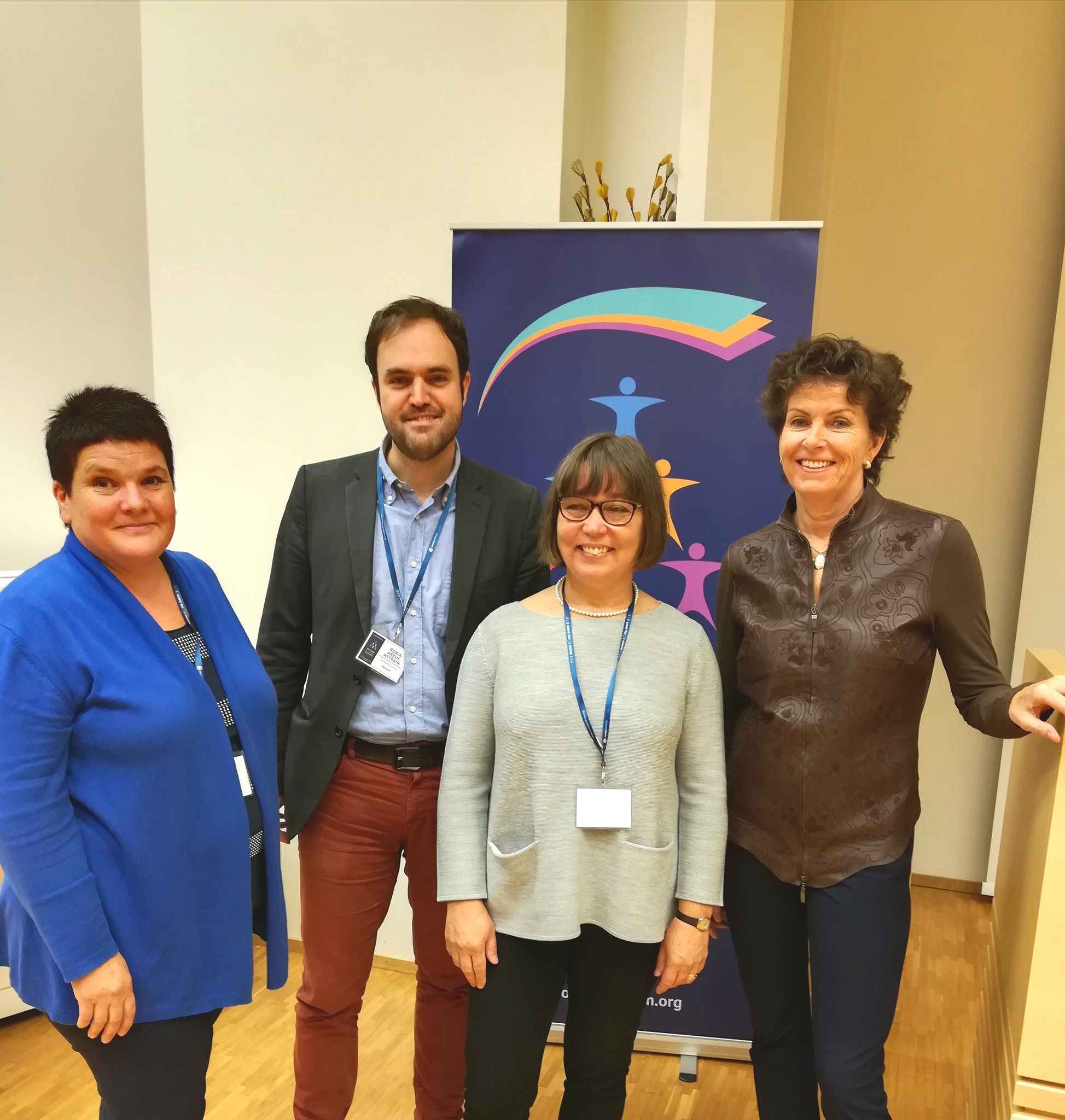
A Study visit and workshop on long-term care, jointly organised with AGE Platform Europe and COFACE Families Europe (as part of Social Platform’s Building Social Europe – Flagship Conference), Helsinki, 17th September 2019. The study visit allowed to shed light on informal carers’ experiences and on the quality of long-term (elderly) care. The key messages emerging from the workshop were disseminated in the form of a joint Press Release by AGE, COFACE and Eurocarers.
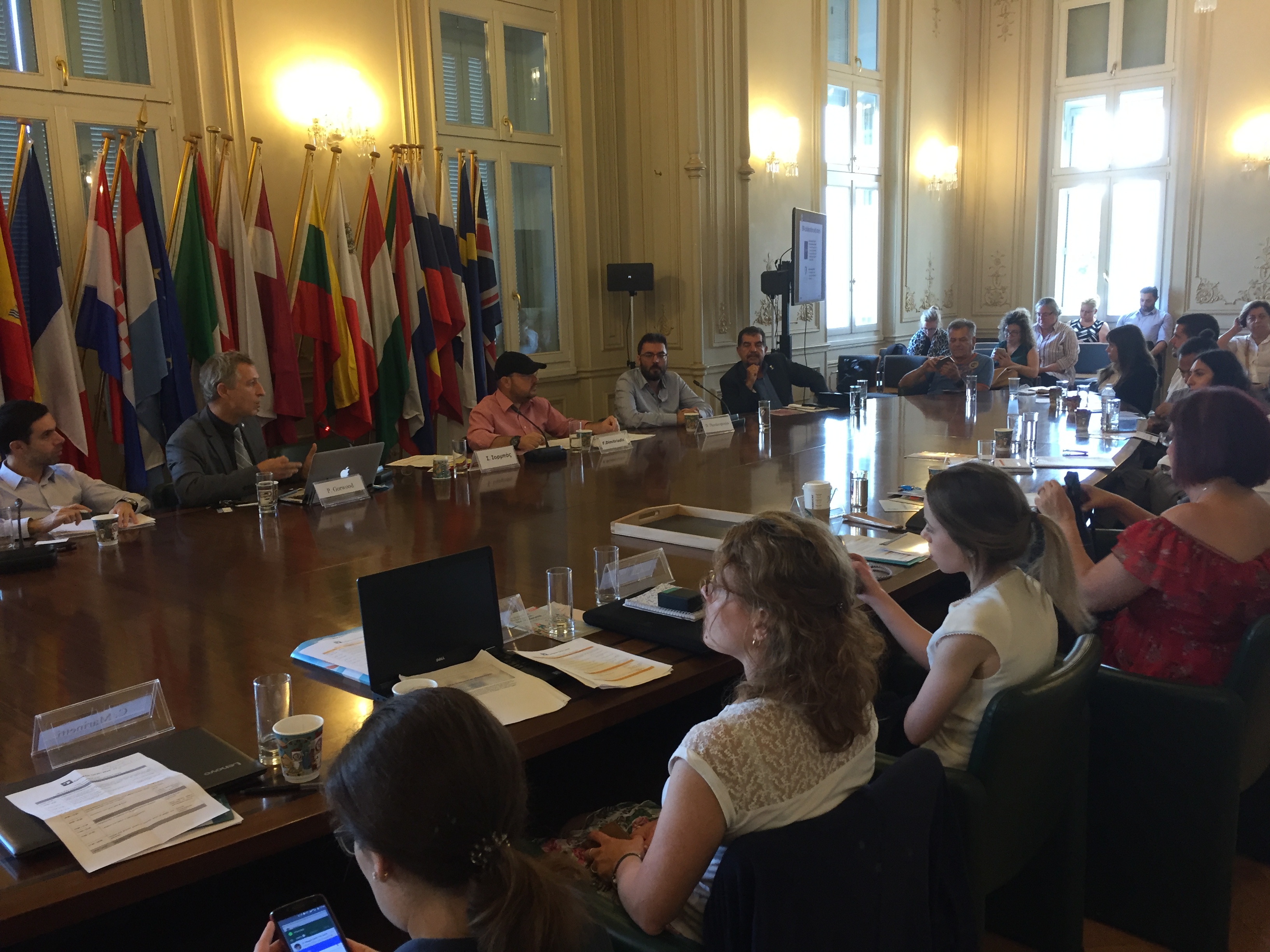
The Caring for Carers conference on “Work-life balance for carer”, organised by EPIONI in the premises of the European Parliament in Athens on the 27th September 2019 and held under the auspices of the Ministry of Health, the Municipality of Athens, the Hellenic Psychiatric Association and WFMH. The event featured interventions by academics, policy makers and stakeholders (including Eurocarers). The event allowed to reflect on the transposition of the Directive and on the need to raise awareness among informal carers about their newly-established rights.
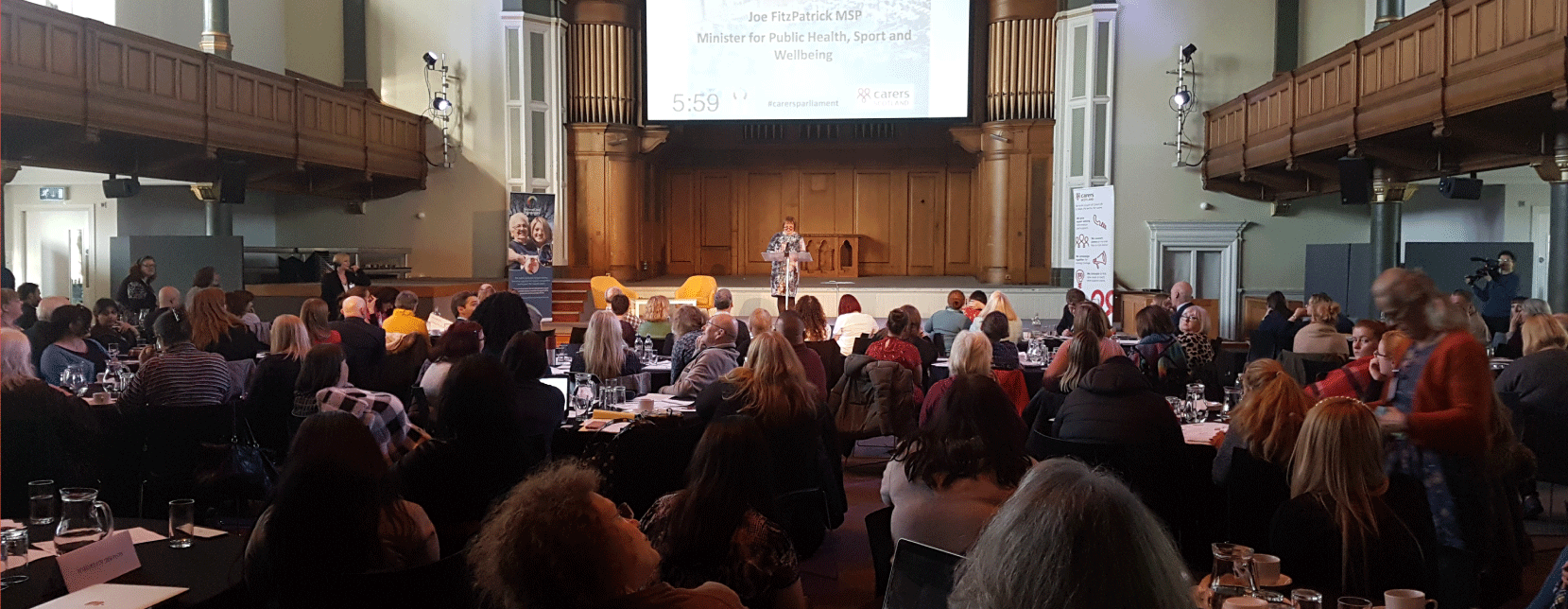
On the 29th and 30th October 2019, a delegation of Eurocarers members travelled to Edinburgh for a study visit on the Scottish policy environment regarding carers followed by the 7th meeting of the Scottish Carers Parliament on the topic of Diversity in care. The study visit was co-organised with our Scottish member organisations (and, through them, the Scottish government) and focused on Carer policy, legislation and practice in Scotland, the financial support available to carers and Carers’ access to respite breaks. The Scottish Carers’ Parliament meeting brought together more than 100 carers and carer representatives from across Scotland as well as policy makers. Members of the Scottish Parliament and government officials, as well as individuals from various organisations and charities, were present and both Joe Fitzpatrick (Minister for Public Health, Sport and Wellbeing) and Alison Evison (President of COSLA – the voice of Local Governments in Scotland) presented responses at the end of the debate. The event provided a great insight into the situation of carers in the region. This year, our delegation consisted of 12 representatives from 6 countries (BE, FI, EL, IE, SE and UK).
Eurocarers also played an active role during a Policy dialogue on “European Policy for informal carers – what’s the news?” and a Seminar on “How to strike a balance for people who are juggling work and care”, both of which were held in Oslo on the 19th November 2019. These two events allowed to inform ongoing national and regional policy debates in Norway, building on existing measures and policy developments across Europe. Both events were attended by about 45 participants including the Norwegian Ministry of Health and Health care Directorate, the Norwegian Board of Health, the Patients’ Ombudsman, Norwegian MPs, officials from the Oslo City Council, trade unions as well as NGOs.
COMMUNICATION
Our communication strategy is implemented through our main website, monthly newsletter, position papers and growing media presence. We can also rely on a database of more than 3000 relevant contacts to disseminate relevant information about carers’ added value and needs. Eurocarers is designed as a platform for collaboration, support, exchange, awareness-raising and policy change
Our main target audiences include carers and organisations that represent them, EU, national and regional policy-makers and practitioners who shape social, health and long-term care services as well as other support and emancipating measures of relevance for carers (employment services, employers and trade unions, educational sector, youth organisations, etc.) Finally, we also collaborate and exchange with a broad network of stakeholders (academics, NGOs and international organisations) who can contribute to the mission of our network.

The Eurocarers website (www.eurocarers.org) serves as a repository of our key research and advocacy material around care and caring. It also progressively develops as an online hub with practical information and good practices target at informal carers themselves and those who support them and their recognition. In 2019, the number of page views on the website amounted to 97.596.

Our monthly newsletter serves to disseminate information about relevant policy instrument and practices that affect carers and ways of using them. It also explores links and synergies with agendas outside of our ‘natural’ ecosystem. The structure of the newsletter includes sections about EU and national policy developments of relevance to care and caring, research and good practices, as well as activities carried out by our member/partner organisations (or other relevant actors) across Europe. Eight editions of our newsletter were disseminated in 2019.
RESEARCH WORK

The mission of Eurocarers is to document the situation and needs of informal carers and contribute to evidence-based policy developments that take account of carers. Developing a strong knowledge base is critical to inform policy in all areas affecting carers, especially in health, care, education, employment, social protection, transport and housing. It also informs evidence-based practice concerning support services for carers and dependent persons. Research is therefore one of the central areas in which our network is engaged.
The need for research and knowledge exchange drives the work of the Eurocarers Research Working Group, which currently brings together 39 expert organisations (mainly universities & research institutes) from 20 countries. The Working Group meets on a regular basis to share and discuss the state of the art in research and good practices that are relevant to our collective work. The Group also explores new emerging opportunities for research work in the area of care and caring in the EU. The Eurocarers Research Working Group held its face-to-face meeting on the 26-27 September 2019 in Ancona. The event was co-hosted with INRCA (Italian National Research Centre on Ageing) in Ancona, Italy. Over 30 participants from 11 countries discussed recently completed or ongoing studies, learned about policy developments in care and caring at European Union (EU) level, and explored the scope for improving indicators on care and caring.
The Eurocarers network is involved in various research and implementation projects aiming to help us formulate policy recommendations for the recognition of carers and carers’ needs.
YOUNG CARERS
Besides the work of its Young Carers Working Group (see above), Eurocarers is currently involved in two research projects on the topic of young carers, thanks to the support of the EU, through the Horizon 2020 and Erasmus+ programmes respectively.
Me-We (Psychosocial Support for Promoting Mental Health and Well-being among adolescent Young Carers in Europe / 2018-2021) aims to mitigate the risk factor of being an adolescent young carer by empowering the young with improved resilience and enhanced social support (from family, schools, peers, services). The specific objectives of the project are to systematise knowledge on adolescent young carers, co-design, develop and test – together with adolescent young carers – a framework of effective and multicomponent psychosocial interventions for primary prevention, and to carry out wide knowledge translation actions for dissemination, awareness promotion and advocacy. In 2019, the Me-We consortium produced a series of seven policy briefs (Italy, Netherlands, Slovenia, Sweden, Switzerland, United Kingdom and Europe) which aim to raise awareness on the situation of adult young carers, fill the knowledge gap, based on research and evidence, and reflect on the policy impact of Me-We’s findings.
EdyCare (Innovative School Education Methodologies and Tools for Guaranteeing Social Inclusion of Young Carers / 2017-2020) aims to empower teachers and other school staff in upper secondary education to recognise adolescent young carers (16-19 years old) in classes and maximize their learning opportunities, while ensuring their social inclusion. To do so, partners have developed various practical tools over the course of the project, including:
- An assessment tool to identify young carers and measure the impact of caring activities on their school attainment, attendance, interaction with peers etc.
- A toolkit of educational strategies, didactical approaches and organisational adjustments that schools can adopt to support young carers in their educational career while taking their caring responsibilities into account.
- A handbook for teachers and school staff addressing important questions, e.g. how to recognise young carers; what to do to support them in schools; how to link with other available services at local level.
- A e-learning course, available free of charge and tested with teachers and school staff, in order to reach the largest possible number of learners in partner countries as well as in Europe.
The handbook and e-learning course are available in 5 languages (English, Italian, Portuguese, Slovenian and Swedish).
ICT-BASED SOLUTIONS FOR CARE
Eurocarers recognises that ICT Tools can greatly benefit the social integration of carers, provide them with social, emotional and peer support, facilitate their participation in aspects of life outside the home and thus improve carers’ quality of life. Our network is therefore involved in research and innovation projects aiming to develop new technology-enabled solutions in favour of carers and care recipients.
The CARE4DEM project , which focuses on Dementia carers, aims to develop a new and innovative model of mutual aid groups which promotes carers’ involvement by introducing web-based tools and integrating it with other types of interventions, in order to enhance carers’ satisfaction with care and reduce burnout. Mutual aid groups are commonly associated with several benefits, including mental and social well-being, by increasing self-confidence, resilience and knowledge. They are a powerful opportunity for non-formal learning, as they help carers cope with difficulties, by sharing of experiences, interaction with peers, building connection and affectivity. The project sheds light on the role of facilitators of such groups, and aims to offer adequate tools to professionals and experienced informal carers willing to take this important role.
A baseline report on web-based mutual aid groups of informal carers had already been released in 2018, which gave an insight of the state of play regarding this promising although underdeveloped tool. A first version of the Care4Dem’s ‘toolbox’ for implementing an innovative online Mutual Aid Group for dementia carers, was finalised in August 2019, including: a Mutual Aid Group model of intervention; a dedicated online platform; a competence profile and an online self-validation tool for Mutual Aid Group’s facilitators; and a blended training for facilitators.
In September 2019, the piloting of this model was initiated in Italia, Portugal and Romania, with very positive results. All the projects’ outcomes will be made available in June 2020, after a phase dedicated to post-test evaluation and fine-tuning. A final seminar will be organised online on 25 June 2020 by Eurocarers.
The Maturolife project is a 3-year EU-funded project that develops enhanced assistive technology products for older adults by using smart metalized textiles, to make older persons lives easier and more independent. To develop these technologies – a smart sofa, garment and shoes – interviews and co-creation workshops were conducted with older persons and their carers in Belgium, France, Germany, Italy, Poland, Slovenia, Spain, Turkey, and the United Kingdom. Findings emphasised a strong need to feel independent, yet safe in older adulthood. 2019 was largely focused on building prototypes, integrating with electronics and sensors, whilst ensuring functionality in terms of quality, safety and reliability. In the next steps, in the course of 2020 older adults and carers will be approached again to test the resulting prototypes.
CARERS AS PARTNERS IN CARE
Integrating care, services and supporting activities means that the design and delivery of care is made in a more effective manner, so that users receive a continuum of preventive, curative, rehabilitative, and support interventions throughout the life course which are suited to their needs over time and are seamlessly available across different levels and areas of health and social systems. Carers are central to the planning, shaping and delivery of services for the people with care needs and in relation to support for themselves. When approached by other actors of the care pathway (i.e. care professionals) as equal partners in the delivery of care, Carers enable people with illnesses or disabilities to remain at home and in their own communities safely, independently and with dignity. Multidisciplinary approaches, including carers’ involvement and perspective, should therefore be supported in order to implement the principles of integrated people-centred care. Eurocarers is involved in various projects aiming to contribute to this aim.
The ENhANCE (EuropeaN curriculum for fAmily aNd Community nurse) Erasmus+-funded Project seeks to address an existing skills mismatch in primary health care, by developing a European Curriculum designated to increase the specialization level of Family Community Nurses (FCN). Today, no European curriculum exists that details the knowledge, skills and competencies for nurses in this field. In 2019 ENhANCE released a first version for a European Curriculum for Family and Community Nurse (at EQF-level 7). It represents the common reference point that was used to develop three localised FCN curricula, currently being piloted at UNIGE (IT), UTH (EL) and UEF (FI). The European FCN Curriculum’s modular and flexible design allows it to be easily adapted to local contexts and needs.
LONG-TERM CARE
The precondition for a carer-friendly society and for good work-life balance for people with caregiving responsibilities is the prevention of frailty and dependency as well as the universal availability of high-quality professional long-term care services. These aspects are indeed essential to reduce the intensity of informal care provision and to allow carers to reconcile their caregiving with a demanding and fulfilling social and professional life. Investment in prevention and in care services should therefore be seen as a priority.
Eurocarers is therefore involved in projects exploring integrated models of long-term care, which take into consideration the needs and preferences of informal carers both as co-providers of care and as secondary users.
The 2-year Homes4Life project aims to deliver by the end of 2020 a new set of tools to support the development of age-friendly housing in Europe. This includes the delivery of a new European certification scheme. Imagine a society where your home is a supportive environment that helps you realise your full personal and social potential. Imagine a society where such homes are within reach for Europeans of all ages, regardless of income, health status, or disability. The Homes4Life vision and other tools such as the Homes4Life functional brief, which frames the scope of the future European certification for age-friendly have now been released.
Eurocarers is member of the Advisory Board:
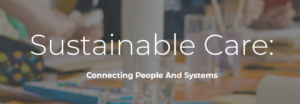
Sustainable Care: connecting people and systems (2017-2021): The Sustainable Care Research Programme, which is coordinated by the University of Sheffield, will explore how care arrangements, currently ‘in crisis’ in parts of the UK, can be made sustainable and deliver wellbeing outcomes; and support policy / practice actors and scholars to conceptualise sustainability in care as an issue of rights, values, ethics and justice, as well as of resource distribution. The project’s overarching objective is to advance understanding of sources of economic and social sustainability in care, especially how wellbeing outcomes can be achieved for care users, their families / carers and paid care workers.
Eurocarers is member of the Advisory Board of:

FUTUREGEN (Evolving gender differences in health & care across cohorts / Gender-ERA-Net, Austrian Science Fund, Swedish Research Council, Canadian Institutes of Health Research – 2019-2021) aims to understand how entwined GENder inequalities in health and care-giving/receiving evolve across GENerations in connection with cultural and social contexts and individual realities, and how identified sex/gender inequalities may evolve in the FUTURE. Current gender inequalities in health and care can be attributed to present-day circumstances and to how people live their lives. Both are changing, but we know little about how these changes are shaping health and care and therefore cannot predict or ameliorate future sex/gender inequalities. To answer these questions, the FUTUREGEN team will apply novel quantitative methods to comparable international datasets covering Europe and North America and obtain older people’s views through participatory qualitative research methods.
THE EUROCARERS EXECUTIVE COMMITTEE
THE EUROCARERS SECRETARIAT
HOW WE ARE FUNDED
Income 2019
| EaSI Programme | 47% | 258.818 |
| Action grants | 39% | 216.195 |
| Membership fees | 8% | 44.500 |
| Sponsorship | 4% | 23.335 |
| Other | 2% | 10.704 |
| Total income | 553.552 |
Expenses 2019
| Staff | 68% | 377.357 |
| Implementation of work programme | 24% | 132.445 |
| Admin costs | 8% | 43.750 |
| Total expenses | 553.552 |
SUPPORTING EUROCARERS
As a member
You can participate in policy-influencing activities on behalf of carers:
- by advocating their needs in the development of European policies, programmes and funding arrangements in areas that truly matter to carers;
- by formulating evidence-based input in policy development to influence European policy debates;
- by participating in EU-funded research projects, which help to shape carers-friendly policies.
You will have access to Information and capacity building:
- Through the Eurocarers network, members exchange information and experience and engage in initiatives of mutual interest;
- Eurocarers provides regular information on relevant developments and helps its members to be better informed, through its capacity-building events, newsletter, website and helpdesk services;
- Eurocarers provides opportunities for networking across boundaries.
You can help to strengthen the voice of carers at national and European level
Carers and their issues are rising up the European policy agenda, due to continuous representation, actively supported by the European Parliament’s Interest Group on carers. While progress has been made, recognition of carers’ issues needs to be both increased and consolidated and your organisation is needed to amplify the voice of carers!
As a partner
Eurocarers recognise that there are common interests between Eurocarers and some companies, to address the needs of carers and cared for persons and safeguard their interests in receiving good quality products and services. Ethics are first and foremost about respecting all members and continually building on trustworthiness. Eurocarers has therefore developed ethical guidelines to govern our relationships with the private sector and ensure the best interests of our members. The basis of sound and equal partnership is recognition of mutual rights and responsibilities. Eurocarers will always protect and safeguard its independence and reputation.
Interested parties can join the Eurocarers network of external partners against a fixed donation which varies according to the type of stakeholder and partnership category they decide to join. Alternatively, partners can also propose a specific issue or initiative around goods, services and environments of relevance to informal carers and on which they would like to work with Eurocarers.
If you want to receive more information about these partnership options, please do not hesitate to contact our Admin and Finance Officer, Ms. Riika Lempiäinen, in our Brussels secretariat at rl@eurocarers.org.
OUR MEMBERS




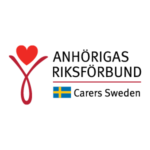



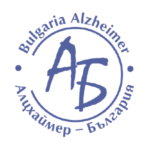

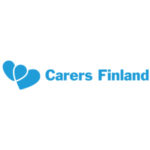


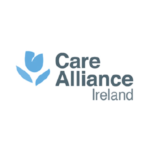


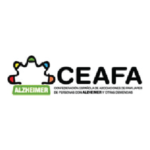


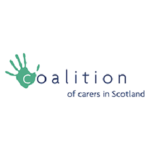





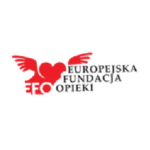
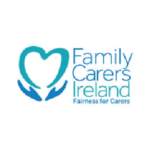



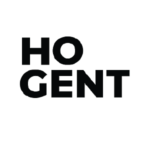
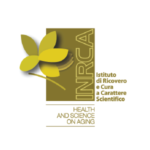

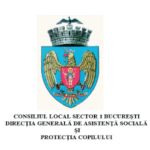




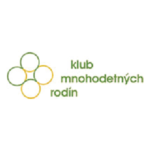
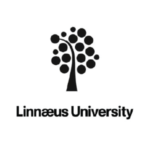

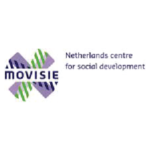
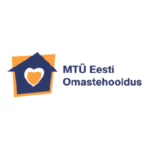
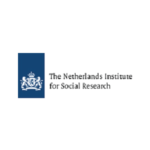
















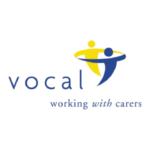




Last Updated on May 26, 2020



